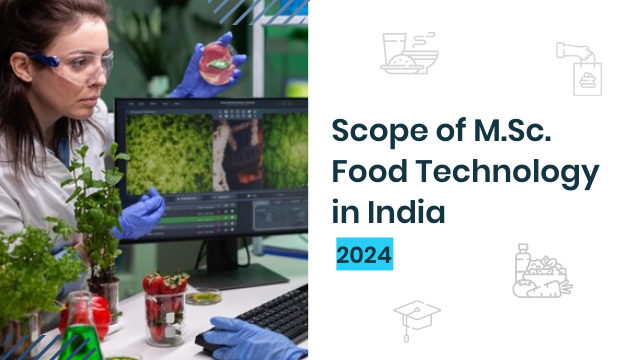In a world where the demand for safe, nutritious, and innovative food products is ever-growing, the field of food technology plays a pivotal role. Pursuing a Master of Science (M.Sc.) in Food Technology in India opens doors to a dynamic and rewarding career in the food industry. This postgraduate program delves into the intricate science behind food processing, preservation, and quality control, equipping students with the knowledge and skills needed to thrive in this evolving sector. Let’s discuss the Scope of M.Sc. Food Technology in India in detail view.
What is M.Sc. Food Technology in India
M.Sc. Food Technology is a postgraduate program designed to equip students with advanced knowledge and skills required in the food processing and technology sector. The curriculum encompasses a diverse range of subjects, including food microbiology, food chemistry, food engineering, food safety, and quality assurance. This comprehensive approach enables students to grasp the entire spectrum of food science, from raw material procurement to the final product on our plates.
M.Sc. Food Technology Curriculum in India
In India, the M.Sc. Food Technology curriculum is designed to provide a comprehensive understanding of the various facets of food processing, preservation, and quality control. Let’s delve into the intricate details of this academic journey and explore the nuances that make it a unique and enriching experience.
Core Components:
- Foundational Courses: The M.Sc. Food Technology curriculum typically commences with foundational courses that establish a strong base in the fundamentals of food science. Students delve into subjects such as food chemistry, microbiology, and biochemistry, gaining insights into the molecular structures and interactions that define the properties of different food components.
- Advanced Food Processing Techniques: As the program progresses, students are exposed to advanced food processing techniques. This includes the study of unit operations involved in food production, such as milling, extrusion, and thermal processing. Practical applications of these techniques are emphasized through hands-on laboratory sessions, allowing students to hone their skills in a controlled environment.
- Food Quality and Safety: An integral part of the curriculum is the focus on ensuring the quality and safety of food products. Courses in food quality management cover topics like food regulations, quality assurance, and food safety standards. Students learn to implement quality control measures to guarantee that food products meet the highest standards set by regulatory bodies.
- Food Engineering and Technology: M.Sc. Food Technology programs in India often include courses in food engineering, where students delve into the engineering principles behind food processing. This encompasses the study of heat and mass transfer, fluid mechanics, and thermodynamics as applied to food systems. Understanding the engineering intricacies allows students to optimize food production processes for efficiency and sustainability.
- Food Product Development: A dynamic field, food product development is a key aspect of the curriculum. Students explore the creative side of food technology by learning to formulate new products, considering aspects such as sensory properties, market trends, and nutritional value. This hands-on experience is crucial for aspiring professionals to innovate in the competitive food industry.
- Research Methodology and Project Work: Research forms a vital part of the M.Sc. Food Technology curriculum. Students are introduced to research methodologies and tools, preparing them for in-depth exploration of topics within the field. The program often culminates in a research project, where students can apply their knowledge to address real-world challenges or contribute to advancements in food technology.
Elective Courses:
Apart from the core components, M.Sc. Food Technology programs in India offer a range of elective courses. These cover specialized areas such as food biotechnology, food packaging, and food analytics. Students can tailor their curriculum based on their interests and career aspirations, gaining expertise in niche areas of food technology.
How to apply for M.Sc. Food Technology in Indian universities?
As India witnesses a growing demand for skilled professionals in the food industry, pursuing an M.Sc. in Food Technology becomes an excellent choice for those aspiring to make a mark in this dynamic field. In this comprehensive guide, we will walk you through the step-by-step process of applying for M.Sc. Food Technology in Indian universities.
- Research and Choose Your Universities: The first step in your application process is to identify and shortlist the universities offering M.Sc. Food Technology programs. Consider factors such as accreditation, faculty expertise, infrastructure, and industry connections. Prominent institutions like the Renaissance University, Indian Institutes of Technology (IITs), National Institute of Food Technology Entrepreneurship and Management (NIFTEM), and state agricultural universities are known for their excellent food technology programs.
- Eligibility Criteria: Once you have your list of potential universities, carefully review the eligibility criteria for each institution. Typically, candidates should have a Bachelor’s degree in Food Technology, Food Science, or a related field with a minimum percentage specified by the university. Some universities may also require candidates to clear entrance exams like GATE (Graduate Aptitude Test in Engineering) or university-specific exams.
- Prepare for Entrance Exams: If the university you’re applying to requires an entrance exam, start your preparations well in advance. Obtain the syllabus, previous years’ question papers, and any recommended study materials. Join coaching classes if necessary, or opt for online study resources to enhance your preparation.
- Gather Required Documents: Assemble all necessary documents for your application, including:
- Academic transcripts
- Degree certificates
- Passport-sized photographs
- Proof of identity
- Category certificate (if applicable)
- Entrance exam scorecard
- Application Process: Follow the specific application procedures outlined by each university. Most institutions offer online application facilities through their official websites. Pay attention to application deadlines and ensure that you submit all required documents accurately. Some universities may also conduct interviews or group discussions as part of the selection process.
- Financial Planning: Consider the cost of tuition, accommodation, and other associated expenses. Explore scholarship opportunities, financial aid, or loans that may be available to M.Sc. Food Technology students. Many universities offer merit-based scholarships or assistance based on financial need.
- Stay Updated: Keep track of application status, important announcements, and any changes in the admission process. Regularly check the official websites and your registered email for updates from the universities.
- Prepare for Interviews (if applicable): If the university conducts interviews, prepare for them by researching commonly asked questions and practicing your responses. Showcase your passion for food technology and your understanding of the program’s relevance to your career goals.
- Finalizing Admission: Once you receive admission offers, carefully compare them based on factors like faculty, infrastructure, placement records, and course structure. Confirm your acceptance by paying the required fees within the stipulated timeframe.
Scope of M.Sc. Food Technology in India
The scope of M.Sc. Food Technology in India is vast and dynamic. This postgraduate program not only equips students with the technical know-how of food science but also prepares them to be leaders and innovators in the ever-evolving food industry. As the demand for safe and sustainable food products continues to rise, M.Sc. Food Technology graduates are poised to play a pivotal role in shaping the future of the food sector in India and beyond.
Here are the reason that effect the scope of M.Sc in Food Technology:
- Thriving Food Industry: With India’s food industry experiencing robust growth, there is an increasing demand for skilled professionals in food technology. Graduates of M.Sc. Food Technology are well-positioned to contribute to the sector’s expansion, ensuring the development of safe and innovative food products.
- Research Opportunities: The program opens doors to research opportunities in both academia and industry. Graduates can engage in research projects aimed at enhancing food safety, exploring sustainable practices, and developing novel food products.
- Quality Assurance and Regulatory Compliance: As consumers become more conscious of food quality and safety, there is a growing need for professionals who can ensure compliance with stringent regulations. M.Sc. Food Technology graduates are equipped to take on roles in quality assurance and regulatory affairs.
- Entrepreneurship: The program fosters an entrepreneurial spirit by providing students with the knowledge and skills to start their own food ventures. From niche products to addressing specific dietary needs, graduates can explore diverse opportunities in the entrepreneurial landscape.
- Global Opportunities: M.Sc. Food Technology opens doors to international job markets. With the global food industry seeking skilled professionals, graduates have the chance to work with multinational companies or contribute to global research initiatives.
Should you pursue an M.Sc. Food Technology in 2024
As we stand on the brink of 2024, prospective students are contemplating the merits of pursuing an M.Sc. in Food Technology in India. This blog will explore the intricacies of this decision, weighing the potential benefits against the challenges in the context of the dynamic food industry.
- Riding the Wave of Innovation:
India’s food industry is undergoing a revolution, with innovation at its core. Pursuing an M.Sc. in Food Technology allows students to be at the forefront of this wave, gaining insights into the latest technologies and methodologies driving food production, processing, and preservation.
- Diverse Career Avenues:
An M.Sc. in Food Technology opens doors to a plethora of career opportunities. Graduates can find themselves working in food research and development, quality assurance, food safety, or even branching into entrepreneurship by starting their own food-related ventures. The degree provides a versatile skill set applicable to various sectors of the industry.
- Meeting Industry Demands:
The food industry is becoming increasingly complex, with consumers demanding healthier, sustainable, and technologically advanced food products. Pursuing a master’s in food technology equips individuals with the knowledge and skills needed to meet these evolving demands, making them valuable assets to the industry.
- Research Opportunities:
For those inclined towards research, an M.Sc. in Food Technology provides a platform to delve into cutting-edge research projects. From developing novel food formulations to studying the impact of food processing on nutritional content, there is ample scope for contributing to the scientific understanding of food.
- Global Perspective:
Food technology is not bound by geographical constraints. With an M.Sc., students gain exposure to global best practices and emerging trends. This international perspective can be a valuable asset, especially in an era where cross-cultural collaboration is becoming increasingly common.
M.Sc. Food Technology Challenges:
- Rapidly Changing Landscape:
While the food industry’s dynamism is an asset, it can also pose challenges. Technology evolves rapidly, and staying abreast of the latest developments requires constant learning. Prospective students must be prepared for a lifelong commitment to staying informed.
- Cost Considerations:
Higher education comes with a financial burden. Potential M.Sc. candidates need to weigh the costs against the potential returns on investment. Scholarships, grants, and the potential for well-paying jobs post-graduation should be considered in this financial equation.
- Adaptability:
The ability to adapt to diverse roles and responsibilities is crucial in the food industry. An M.Sc. in Food Technology may expose graduates to roles beyond their initial expectations. Prospective students should embrace the prospect of versatility and be ready to adapt to the evolving demands of the industry.
In Indian education, pursuing an M.Sc. in Food Technology in 2024 holds immense promise. The intersection of innovation, diverse career opportunities, and global perspectives makes this choice appealing. However, prospective students must weigh these advantages against the challenges, ensuring that they are ready for the dynamic and ever-changing nature of the food industry. As we approach 2024, the decision to pursue an M.Sc. in Food Technology in India is not just an academic one; it is a step towards shaping the future of the culinary world.







